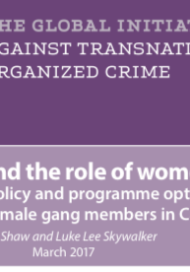Posted on 26 Apr 2017
Gangs, violence and the role of women and girls: Emerging themes and policy and programme options drawn from interviews with female gang members in Cape Town (Global Initiative, April 2017)
What do we learn from applying a gender lens to studies of gangs, gang violence and policy options regarding these two phenomena which are present not only in Central and South America but also in South Africa and elsewhere?
Mark Shaw (Director, Global Initiative) and Luke Lee Skywalker (PhD Candidate, University of Cape Town) drafted a report that includes over 30 interviews with female gang members in Cape Town. The focus of this Policy Note is specifically on the role of women and girls in gangs as an opportunity to examine whether a more “gendered” response to the phenomenon of gangsterism could have success.
The case study for the research was the gangs of Cape Town, a city not only with a historical problem of gangs, but one where recent trends have showed a dramatic upswing in violence, both within and between gangs. Cape Town was chosen largely because it offered the possibility, through the network of the Global Initiative and its links to the University of Cape Town, for interviewing female gang members in a way that would have been difficult to achieve elsewhere.
The resulting Policy Note, Gangs, violence and the role of women and girls: Emerging themes and policy and programme options drawn from interviews with female gang members in Cape Town, summarises the main emerging themes:
- Women and girls seek “belonging” within gangs
- Sex is a common currency in gang interactions involving women
- Female gang members have a history of abuse (and are quite literarily giving birth to a new generation of gang members)
- Female gang participants become enmeshed in gangs and are often under considerable control and surveillance
- Female gang members participate in criminal and violent acts
- Women and girls while being members and confidents of male gangster are largely excluded from leadership positions
- Female gang members often suffer (sexual) abuse by the criminal justice system
From these insights, the two authors are able to suggest elements for a comprehensive policy framework for programming that incorporates short-, medium- and long-term measures to reduce female involvements in gangs and offer sustainable alternatives.





